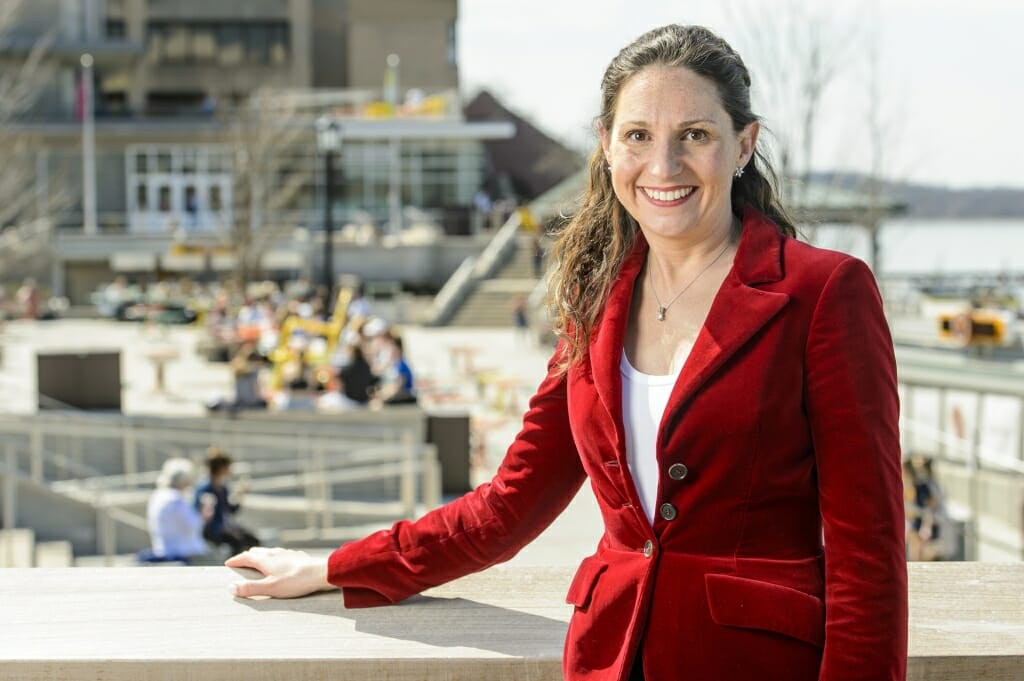SoHE’s Christine Whelan on her time in the media

Christine Whelan, clinical professor and director of the Money, Relationships and Equality Initiative in the School of Human Ecology at the University of Wisconsin–Madison, is pictured at the Memorial Union Terrace. Photo: Bryce Richter
Christine Whelan is a clinical professor of consumer science in UW–Madison’s School of Human Ecology
You’ve had a range of media experience – everything from discussing your book on Good Morning America to appearing on Wisconsin Public Radio’s Larry Meiller show. How do the different mediums – radio, TV, and print – affect the experience for you?
I get a thrill from being “on” — whether it’s on camera or on radio. You’ve got to roll with whatever happens. One of my favorite things is live, call-in radio because you have no idea what the questions will be. Being interviewed for print is similar to a conversation, but writing an op-ed is a different experience: It’s more considered, much more time consuming and has a more permanent feel to it. Honestly, I love them all because I get a deep satisfaction from translating academic research for a broad audience. My hope is that every time I speak with the media, a lightbulb goes off for at least one person, encouraging them to think differently and approach the world in a new way.
How would you articulate the value of engaging with the public through media?
A few years ago I attended a self-help workshop in which we were challenged to identify our “superpower” — the thing we were really good at that would help better the world. After giving this some thought, I realized that my superpower is translation. I take academic research and translate it so that it can have a positive impact on the lives of as many people as possible. Even more than that, I help people understand complex topics and apply them to their lives with a small-steps approach for behavior change. Many more researchers could do this with their own areas of expertise. By engaging with the public we can turn research into action.
What’s your top piece of advice for someone making their first media appearance?
1. If you’re going on TV, ask for the questions in advance. Then think about the three sentences you want to get across. Practice those sentences while looking at yourself in the mirror – it’s a very odd thing to do—and if you can do that, looking at a camera or an interviewer is much easier. Make sure you make your points early in the segment. It goes by fast!
2. If you’re going on live radio and you’re a bit anxious, write out some two-sentence points and ideas that you want to get across. Bring the paper in with you to the studio. No one will see!
3. If you’re doing a print interview, write out your points in advance to make sure you get it right. And email the reporter with those ideas again as follow-up if you think there’s any concern about accuracy.
4. And once the segment or article is available to share, post it on all your social networks. That’s where you can exponentially increase the impact of your ideas!
Any most memorable stories to share?
I’ve been interviewed on everything from Barbies to Bernie Sanders. But my most memorable TV experience was the biggest one: When my first book came out I was invited on Good Morning America. The network sent a driver to pick me up very early in the morning to do full hair and makeup. I was so nervous! I remember walking into the studio and sitting across from Robin Roberts… and then before I knew it, it was over. I’d done well and I was proud. I walked out of the studio feeling like a star … and sure enough, everyone was staring at me as I walked down the street. “Wow,” I thought. “They must have all seen me on the big screen in Times Square a few minutes ago. I’m famous!” I had a new spring in my step… until I saw my reflection in a mirrored store window, and gasped. Alas, folks on the street had just been staring at me because the high-definition makeup made me look like a clown. Brought back down to earth after my brief “stardom,” I still giggle about that moment today. Get out there and share your ideas. It’s probably not going to make you a star, but you will be advancing your field and helping real people live better lives.
